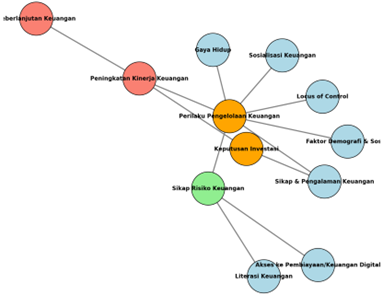Theory of Planned Behavior (TPB) Analysis: A Systematic Review of Key Factors of SMEs Financial Planning Behavior
Main Article Content
Ahmad Murdiono*
Agung Winarno
Heri Pratikno
Economic challenges are closely linked to discussions about micro, small, and medium enterprises (SMEs) due to their vital role in GDP contribution and job creation. Despite this, the progress of small businesses evolving into sustainable entities has been sluggish over the last decade. Therefore, it is crucial to conduct research aimed at bolstering the capabilities of SMEs in Indonesia. This research examines the financial behavior of SMEs through a Systematic Literature Review (SLR) approach. The goal is to pinpoint the factors that affect SMEs' financial behavior and their implications for financial planning. The SLR process consists of three key stages: identification, selection, and synthesis, with this study analyzing 15 pertinent articles. The results indicate that financial behavior is shaped by various factors, such as financial literacy, financial satisfaction, financial socialization, and mental accounting. This research serves as a resource for stakeholders in the SME sector, including researchers, practitioners, and policymakers, to enhance the capabilities of SMEs in Indonesia. Additionally, the findings aim to contribute to the global financial literature by offering a more organized behavioral finance model.
Abisuga-Oyekunle, O. A., Patra, S. K., & Muchie, M. (2020). SMEs in sustainable development: Their role in poverty reduction and employment generation in sub-Saharan Africa. African Journal of Science, Technology, Innovation and Development, 12(4), 405–419.
Adiputra, I. G., Bangun, N. A., & Graceilla, B. (2024). The Influence Of Financial Socialization, Overconfidence And Mental Accounting On Investment Decisions. Jurnal Manajemen, 28(1), 200–221.
Ajzen, I. (1991). The theory of planned behavior. Organizational Behavior and Human Decision Processes, 50(2), 179–211. https://doi.org/10.1016/0749-5978(91)90020-T
Bernando, F. O., Ray, E. L., & Oktaviano, B. (2023). SME’s Fınancıal Behavıor; Access To Fınance, Fınancıal Lıteracy And Fınancıal Experıence. Jurnal Ekonomi, 12(04), 1790–1798.
Buchdadi, A. D., Sholeha, A., & Ahmad, G. N. (2020). The influence of financial literacy on SMEs performance through access to finance and financial risk attitude as mediation variables. Academy of Accounting and Financial Studies Journal, 24(5), 1–15.
Damayanti, U. R., Nirmala, A. R., & Nurani, R. (2023). The Influence Of Financial Knowledge, Financial Experience, And Income On Management Behavior Family Finance. Proceeding International Conference on Economic and Social Sciences, 1, 352–365.
Fathihani, F., & Rosdiana, R. (2024). Pengaruh Fınancıal Lıteracy, Locus Of Control, Lıfestyle Terhadap Fınancıal Management Behavıor. Journal of Management and Innovation Entrepreneurship (JMIE), 1(4), 712–723.
Fishbein, M., & Ajzen, I. (1977). Belief, attitude, intention, and behavior: An introduction to theory and research.
Frimpong, S. E., Agyapong, G., & Agyapong, D. (2022). Financial literacy, access to digital finance and performance of SMEs: Evidence From Central region of Ghana. Cogent Economics & Finance, 10(1), 2121356.
Kitchenham, B., & Charters, S. (2007). Guidelines for performing systematic literature reviews in software engineering. UK.
Kusumardiyani, H. N., Setiawati, R., Wediawati, B., & Hasanah, U. (2023). The Effect Of Fınancıal Lıteracy And Fınancıal Technology On Mıcro-Busıness Performance Medıated By Fınancıal Inclusıon (Case Study Of Mıcro-Busınesses In Muara Bulıan Dıstrıct). JOURNAL OF BUSINESS STUDIES AND MANAGEMENT REVIEW, 6(2), 253–258.
Lučić, A., Barbić, D., & Uzelac, M. (2023). Theoretical underpinnings of consumers’ financial capability research. International Journal of Consumer Studies, 47(1), 373–399.
Mitchell, O. S., & Lusardi, A. (2022). Financial literacy and financial behavior at older ages. In The Routledge Handbook of the Economics of Ageing (pp. 553–565). Routledge.
Nafitri, S. D., & Wikartika, I. (2023). Pengaruh pendapatan, gaya hidup dan literasi keuangan terhadap perilaku keuangan pada mahasiswa manajemen Universitas Pembangunan Nasional" Veteran" Jawa Timur. Management Studies and Entrepreneurship Journal (MSEJ), 4(1), 766–774.
Risman, A., Ali, A. J., Soelton, M., & Siswanti, I. (2022). The behavioral finance of MSMEs in the advancement of financial inclusion and financial technology (Fintech).
Salim, S. (2023). Promoting Firm Performance via Board of Directors Effectiveness: A Study of Financial Services Companies in New Orleans. Journal Of Management, Accounting, General Finance And International Economic Issues, 3(1), 16–31. https://doi.org/10.55047/marginal.v3i1.848
Sari, Y., Nugroho, M., & Rahmiyati, N. (2023). The effect of financial knowledge, financial behavior and digital financial capabilities on financial inclusion, financial concern and performance in MSMEs in East Java. Uncertain Supply Chain Management, 11(4), 1745–1758.
Sherraden, M. S. (2013). Building financial capability and assets of financially vulnerable families. Financial Education and Capability: Research, Education, Policy, and Practice, 323.
Shintawati, M. P. D., & Budidarma, I. G. A. M. (2023). The Effect Of Income And Financial Literacy On Investment Decisions With Financial Behavior As An Intervening Variable. International Journal of Science and Society, 5(5). https://doi.org/10.54783/ijsoc.v5i5.864
Singla, A., & Mallik, G. (2021). Determinants of financial literacy: Empirical evidence from micro and small enterprises in India. Asia Pacific Management Review, 26(4), 248–255.
Stolper, O. A., & Walter, A. (2017). Financial literacy, financial advice, and financial behavior. Journal of Business Economics, 87, 581–643.
Subash, R. (2012). Role of behavioral finance in portfolio investment decisions: Evidence from India.
Syaliha, A., Sutieman, E., Pasolo, M. R., & Pattiasina, V. (2022). The Effect of Financial Literacy, Life Style, Financial Attitude and Locus of Control to Financial Management Behavior. Public Policy, 3(1), 52–71.
Thaler, R. H. (1999). Mental accounting matters. Journal of Behavioral Decision Making, 12(3), 183–206.
Widyakto, A., Liyana, Z. W., & Rinawati, T. (2022). The influence of financial literacy, financial attitudes, and lifestyle on financial behavior. Diponegoro International Journal of Business, 5(1), 33–46.
















